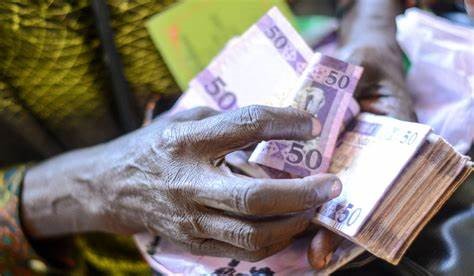
Man counts a bundle of 50 SSP notes. [Photo: ELRHA]
South Sudan’s pound currency has continued to weaken drastically against the United States dollar, triggering a sharp increase in commodity prices across the country.
The situation has left many families struggling to put food on the table.
The Central Bank exchange rate posted on Monday, March 4, 2024, shows one dollar trading at an average of 1,518 South Sudanese pounds, while in the black market, one dollar cost around 1,700 pounds.
This shows a drastic increase in the depreciation of the local currency as the figures of last week shows a dollar trading at 1,361 pound in the parallel market.
Early in February, the exchange rate stood at 1,100 pounds for one US dollar.
The country has lately been hit by economic hardships that have left the government struggling to pay civil servants salaries, as the public workforce goes for months without its dues.
The situation has been blamed on dwindling revenue due to the impact of the war in Sudan and the Red Sea blockade on the country’s previous oil export.
In February 2024, the Governor of the Bank of South Sudan Dr. Alic Garang announced a series of measures aimed at stabilizing the foreign exchange market amidst the currency fluctuations.
The institution reaffirmed its commitment to ensuring price stability and efficiency in the market while acknowledging the impact of exchange rate movements on prices.
The bank stated it will intervene in the foreign exchange market by conducting weekly auctions of foreign currency at a revised bank rate, aiming to strengthen the South Sudanese Pound
In a press release issued by Garang, he announced plans to deploy countermeasures to stabilize the exchange rate by supplying additional resources to alleviate pressure on the external sector and balance of payments.
But the policies have apparently yielded little impact due to hindrance on the country’s most valuable revenue-generating resource – the crude oil.
The Managing Director of Nile Petroleum Corporation said on February 28, that the flow of South Sudan crude oil to Port Sudan will soon be restored following reports of pipeline damages.
Engineer Bernard Amour said a team of engineers and technicians were being engaged in repairing the damaged oil pipelines crossing the Sudanese territory.
Meanwhile, the Deputy Chairperson of SPLM-IO said the country’s prevailing economic situation is man-made, citing what he terms as a “state capture” by private entities and individuals.
Oyet Nathaniel argued that the country generates more than two billion US dollars from oil sales and 200 million dollars from non-oil revenue collection, in a year.
Lawmaker Oyet, also the First Deputy Speaker of Parliament, said the revenue is more than enough to pay for the operational cost of the government and the monthly salaries of civil servants.
Support Eye Radio, the first independent radio broadcaster of news, information & entertainment in South Sudan.
Make a monthly or a one off contribution.
Copyright 2024. All rights reserved. Eye Radio is a product of Eye Media Limited.